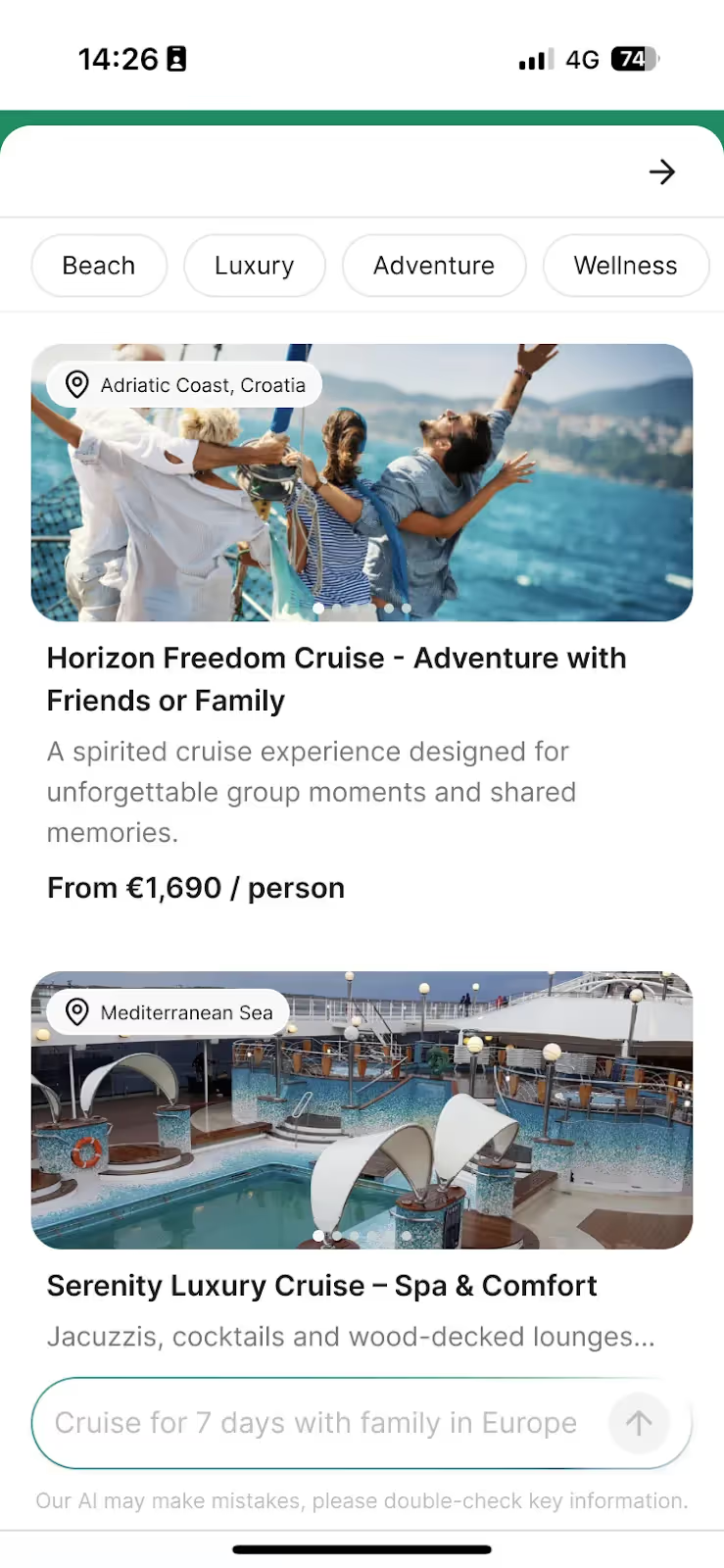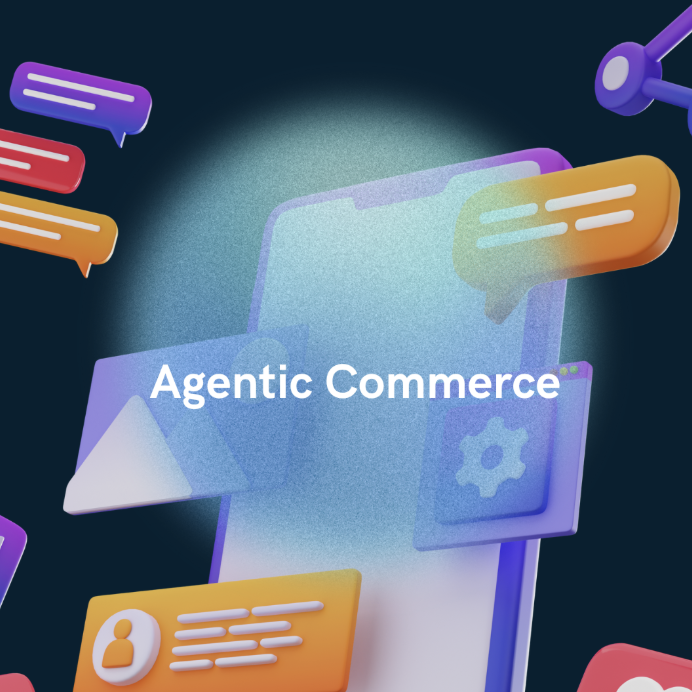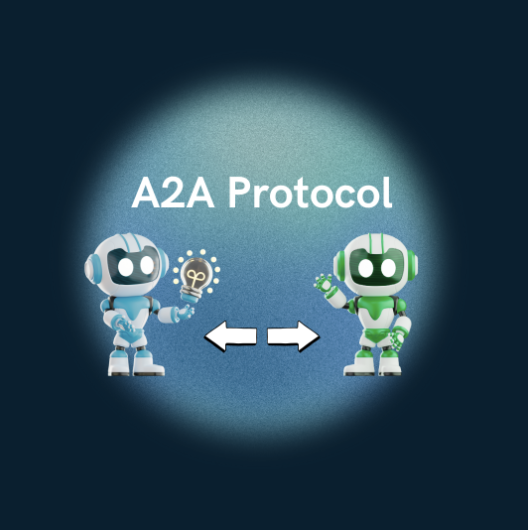Introduction
The excitement of planning a cruise often clashes with the outdated experience of actually booking one. In 2025, many travelers still find themselves picking up the phone to confirm details and finalize reservations. Today, around 75% of luxury cruise bookings still go through travel advisors. That’s because cruise planning is complex - from choosing the right ship and cabin to customizing excursions - and travelers still turn to human experts for reassurance, perks, and personalisation. Even more striking, a big number of these calls happen after 7 PM or during weekends when most customer support is usually unavailable or have long waiting lines (Some customers report waiting more than two hours and even up to three hours during peak times). That disconnect is costing cruise operators lost conversions and dissatisfied customers.
Cruise travel is booming with 34.6 million people that sailed in 2024, and that number’s expected to jump to 37.7 million in 2025, according to CLIA’s latest report. But while the ships are getting bigger and the experiences more luxurious, the booking process hasn’t caught up. Most travelers are still stuck dealing with outdated filters, clunky forms, or long response times when all they want is a smooth, personalized experience from the start.
Why Cruise Booking is Broken
Booking a cruise is far more complex than booking a flight or hotel. Travelers are faced with numerous decisions, such as choosing from dozens of itineraries, understanding different cabin types, comparing dining packages, adding excursions, selecting departure ports, and factoring in loyalty programs or seasonal pricing. This layered decision-making process overwhelms both first-time and seasoned cruisers, often leading them to call customer support for clarification on even trivial questions, like whether a specific boat has a heated pool or how big a cabin is. These high volumes of low-value calls don’t just clog phone lines and create longer waiting times for customers, but they’re also incredibly expensive for cruise lines to manage.
The data backs this up. Travel bookings have some of the highest cart abandonment rates across industries, with cruise and ferry bookings reaching up to 98%. This means nearly all users who start planning a cruise leave before completing their booking. These high drop-off rates reflect how current booking systems often fail to support users through complex travel decisions.
Most websites rely on static filters and long forms that force users to figure out the right path themselves. As a result, many abandon their search out of frustration or uncertainty.
This is where Conversational AI can make a huge difference. By guiding users through a series of natural, adaptive questions, it removes the need for them to navigate the complexity alone. Instead of overwhelming choices, users get clear, personalized recommendations - making the path to booking simpler, personalized, smoother, and far more effective.
In fact, a McKinsey study found that nearly three out of four consumers feel frustrated when a brand doesn’t offer a personalized experience, and over 71% actively expect companies to tailor their interactions. When applied to cruise booking, where decisions are detailed and time-consuming, personalisation isn’t just a nice-to-have - it’s essential.
AI in Cruising
Meet Lisa: Simplifying Your Customer’s Cruise Booking Journey
Lisa doesn’t just personalize with words, she transforms visual experiences, too. The image below showcases Lisa in action, guiding two different user profiles through completely different cruise recommendations. On the top of the image, we see the Horizon Freedom Cruise, perfect for families or groups seeking spirited adventure along the Adriatic coast. At the bottom, the Serenity Luxury Cruise is surfaced for users seeking spa comfort and relaxation in the Mediterranean.

These aren’t random suggestions. Lisa tailors results based on user input in real time-things like destination preferences, travel dates, and group size-while drawing from live inventory. Each user gets an interface and recommendation set that feels built just for them. This reduces decision fatigue and accelerates booking.
Lisa is Kleio’s AI agent designed to engage users the moment they land on a cruise site. She opens the conversation in natural language. For example, if someone visits a travel site at night and searches broadly, Lisa steps in:
"Looking for a getaway? I can help you explore cruise options based on your budget, travel dates, and preferred destination. Want to start with Europe or the Caribbean?"
The conversation evolves based on context. Lisa pulls real-time inventory and sailing availability, asks layered questions to clarify guest preferences such as cabin category, itinerary length, embarkation ports, and shore excursions, and updates suggestions instantly. When needed, she passes high-intent leads to human agents with full transcripts, booking history, and user insights for seamless conversion and upsell opportunities such as premium cabins, drink packages, spa treatments, specialty dining, or pre and post-cruise hotel stays.
But Lisa isn’t alone - Alex, Kleio’s sales copilot agent is purpose-built for high-touch, high-consideration journeys like cruise sales. He supports advisors in real time, whether on a call or in-store, by surfacing live cabin availability, pricing options, and upsell opportunities based on customer intent.
He draws from past interactions, highlights key signals such as group size or preferred destinations, and even drafts personalized follow-ups so agents can respond faster. With Alex by their side, cruise advisors are no longer juggling tabs or digging for details. They’re fully equipped to guide travelers with confidence and close more bookings, faster.
This way, your website transforms a passive browsing session into a guided journey that leads to booking while augmenting your sales representatives with everything they need to close a deal.
When Havas Voyages deployed Lisa, they saw a 50% increase in online conversion rates and a 200% rise in qualified leads generated.
AI in Cruising: What's the Gap, and Why Cruise Booking Still Fails Customers
Cruise lines have made bold moves with AI, but mostly in the post-booking experience, which in this context, is during the trip. Carnival’s Ocean Medallion helps guests pay, navigate, and personalize their time onboard. MSC’s Zoe and Costa’s Futura offer basic voice assistance in cabins. Virgin Voyages introduced Jen AI to handle restaurant bookings and onboard navigation. These are impressive tools and definitely enhance onboarding experiences for customers. They improve the guest experience once someone is already booked.
But that’s not where most customers struggle.
The real drop-off happens long before the cruise begins. Booking a cruise online is still a complicated, often frustrating process. Travelers face a maze of filters, unfamiliar cabin types, unclear dining packages, loyalty benefits, and dozens of itineraries. It’s no surprise that many end up picking up the phone just to figure it out.
Today, 75% of cruise bookings are still completed offline. That’s not a sign of progress - it’s a sign that digital booking journeys are broken, and that’s a business problem. It means the place where most people begin their journey, your website, isn’t doing enough to convert - especially considering that 80% of travelers now consider it important to be able to book their entire trip online.
This failure is expensive. Every call to a support agent adds cost and friction. Every bounced visitor on your site is a missed sale. And when bookings can’t be completed online, your growth depends on adding more headcount, not better technology - and that’s not scalable.
The industry has accepted this as the norm - but it doesn’t have to be. The real opportunity is not in adding more onboard AI gimmicks - it’s in fixing the complex booking purchase journey itself. That’s where AI agents like Lisa make the difference.
Lisa meets customers at the moment of intent. She helps them articulate what they’re looking for, clarifies confusing decisions, and presents ready-to-book options in a simple conversation. She doesn’t just support the journey. She drives it forward.
Whether it’s increasing conversion rates, easing the burden on your agents, or generating more revenue from existing traffic, Lisa solves the right problem. Because AI shouldn’t just impress your guests once they board. It should earn them in the first place.
What Makes Lisa Technically Different
Lisa is powered by Kleio’s enterprise-grade platform, with:
- Knowledge graph that maps relationships between products, ships, excursions, destinations, and user preferences
- Multi-agent orchestration that handles qualification, product recommendation, booking, and handoff simultaneously
- Hallucination-free reasoning, pulling only from verified data
- Full GDPR compliance and encrypted architecture
Lisa works across web, app, and messaging channels with no loss of context. She is available 24/7 and improves over time with each user interaction.
Transforming Booking into Revenue
What Lisa ultimately does is turn a broken booking experience into a high-converting, scalable customer journey. She doesn’t wait for interest to become frustrating. She meets it head-on, guides it, and closes it.
And she does it without needing a support team to be online 24/7. This is what makes her such a powerful digital sales and marketing agent.
Book a demo
FAQ
What is conversational AI in cruises?
A natural language assistant that guides and helps users get cruise recommendations and book it through hyper-personalization, and eliminates forms, filters, or agent delays.
How is Lisa different from traditional chatbots?
Lisa guides full purchasing journeys, adapts to user inputs in real time, adapts with the site’s UI across the user journey, and works across platforms while integrating with real-time inventory, unlike chatbots that are designed to answer customer support questions only.
What kind of results can Lisa drive?
At Havas Voyages, Lisa increased online conversion rates by 50% and generated 200% more qualified leads.
Can she hand off to sales agents?
Yes. Lisa escalates leads with full context, reducing friction and improving close rates. It gives automatic quote preparations, recommends upsell opportunities, and augments your agents with data to close the client with speed, personalisation, and precision.
Is Lisa secure and compliant?
Absolutely. She’s fully encrypted and adheres to enterprise-grade security and GDPR.





.avif)




_COMPRESSED.gif)






